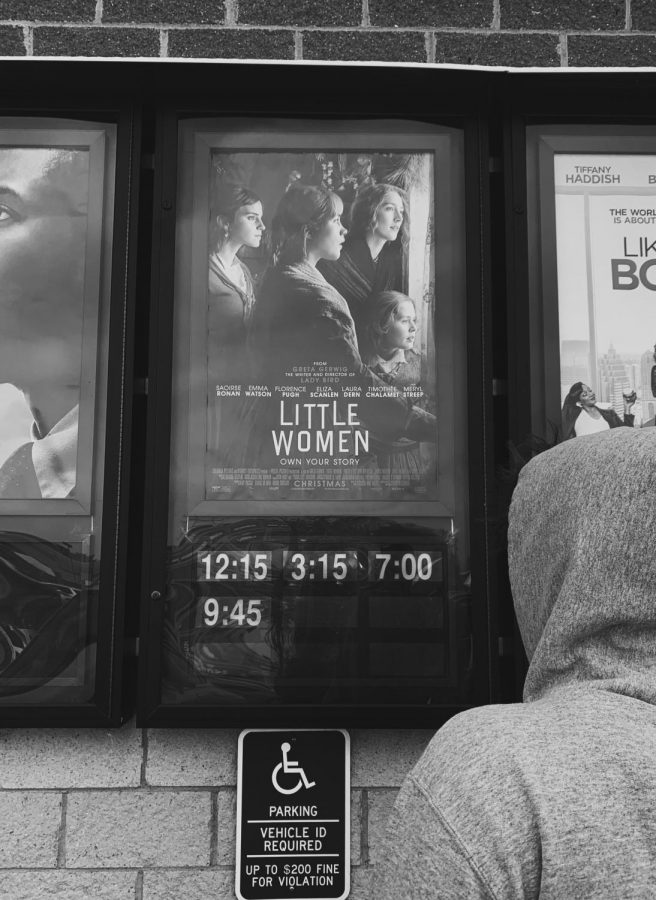‘Little Women’: a fresh literary adaption
‘Little Women’ was released to theaters on Dec. 25, so far grossing $60 million at the box office with a 95 percent fresh rating at Rotten Tomatoes.
January 16, 2020
Nina Johnson
Editor in Chief
Countless Little Women adaptions have made the big screen throughout the twentieth century. However, Greta Gerwig’s latest adaption brings an entirely new dimension to Lousia May Alcott’s famed novel, all the while adding a layer of modernity that makes such a timeless story feel like it rightfully belongs in 2020. On Christmas Day, fans trekked to theaters, both die-hard Little Women fans and Gerwig critiques alike.
Reminiscent of the 2017 film Lady Bird, Little Women boasts a star-studded cast with many fan favorites returning to play a role in Gerwig’s second Oscar-nominated film. Among the returnees included Saoirse Ronan as Jo, Timothee Chalamet as Laurie and Tracy Letts as the quintessential publisher who appears throughout the film. Other notable cast members include Emma Watson as Meg, Meryl Streep as the wealthy and widowed aunt, Florence Pugh as Amy and Laura Dern as the March sisters’ mother. Ronan and Pugh are both up for Oscars in the 92nd Academy Awards, with the film totaling six nominations in 2020, including Best Picture.
In classic Gerwig fashion, she acutely depicts a girl’s youth transitioning to adulthood, and the complexities, joys and sorrows that surround that transitional time. Lady Bird showed Gerwig’s debut understanding of a passionate and mistake-ridden youth; Little Women multiplied her gifts by four—depicting the inseparable bond of four young women who above all else, are each other’s. Gerwig paid homage to a classic tale of adventure and follies but incorporated a methodical intensity that was much needed for a twenty-first-century audience.
The film begins seven years into the future, already distinguishing itself from the novel as well as other film adaptions Without giving away any of Gerwig’s masterfully done scenes, the film follows an intentionally jumbled timeline that serves to the details of the film. The seamless jump between past and present makes for an emotional and fast-paced journey through the March sisters’ lives.
Gerwig trusts the medium in her hands and uses this twisted usage of time solely to her advantage by putting trust in the intelligence of the audience to follow. Time is something that makes this film special, and all aspects of the film enhances the magic of an unchronological plot.
Gerwig’s characterization of Jo is what makes the film resoundingly unique, ironic and absent of cliches. A character’s childhood is what shapes the development of their characterization and their decisions throughout adulthood. The implications of youth–Gerwig’s specialty–and Little Women’s lengthy timeline harbors the perfect place for a fresh take on the distinctive and transformative ways personal experiences and family background turn into art, and in the case of Jo, popular art, as she finally publishes an autobiographical novel at the end of the film.
Though much of the story is through the eyes of the girls, we occasionally catch a glimpse into the minds of potential suitors or a kind neighbor. There is a keen distinction between the sisters and their counterpoints, which time and time again aids in understanding the affectionate bond between the March sisters. With no intention of creating a divide, Gerwig places a high emphasis on the emotional intelligence of the girls, often pointing out the lapses in the depth of the male book publisher, Tracy Letts, or Laurie’s apprehension with the March sister’s bountiful energy and affection.
While some may critique this intentional disparity between the male and female characters, many viewed it as a harmless way to highlight and empower the qualities of women that Louisa May Alcott viewed as imperative yet overlooked in society. “Women have minds and souls as well as hearts, ambition and talent as well as beauty and I’m sick of being told that love is all a woman is fit for,” Jo March said in a conversation with her mother.
Gerwig’s exceptional screenwriting fashions a story that satisfies the novel’s original intent without falling victim to an antiquated view of 19th-century life–yet remains refreshing and modern. The four young women seek to offer a version of everyone viewing the film, opening it up to all audiences.
Greta Gerwig is one of the most talented directors of this decade, and will undoubtedly be the genius behind many films in the coming years. Little Women, however, will be hard to beat. Gerwig crafted a film that artfully grasped the realities of a 19th-century woman all the while giving complex insight into women in this day and how they demand to be seen, heard and respected.






























































